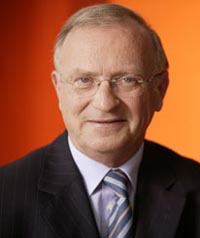Russia's election not fair, international observers say

International observers said Monday that Russian Parliamentary elections were not fair and didn’t meet European democratic standards because President Vladimir Putin and his government abused his power to make people vote for him – as the other parties were harassed.
The central conclusion was that Sunday's vote "failed to meet many of the commitments and standards that we have," said Goran Lennmarker, president of the Organization for Security and Cooperation in Europe's Parliamentary Assembly. He said it was "not a fair election."
Luc van den Brande, who headed the delegation from the Parliamentary Assembly of the Council of Europe, pointed to a lack of real separation of the branches of power, saying that the vote appeared to be more of a referendum on Putin's policies than a parliamentary election.
Van den Brande cited an "overwhelming influence of the president's office and the president on the campaign" and said there was "certainly abuse of administrative resources" to influence the outcome. He also said there were "flaws in the secrecy of the vote."
"Effectively, we can't say these were fair elections," he said at a news conference.
The two groups said in a joint statement that the elections were well organized, but added "there was not a level political playing field in Russia in 2007." They said the vote took place in an atmosphere that "seriously limited political competition," pointing at official interference, media coverage biased in the Kremlin's favor and new election laws that hindered political pluralism.
"There are a lot of concerns about the evolution of democracy" in Russia, van den Brande said. "Political stability and economic growth should go hand in hand with ... strengthened democracy."
Lennmarker cited reports of widespread harassment of opposition parties as one of the problems with the campaign.
"I'm sad to say, I hoped that this would be a step forward" for Russian democracy, he said. "But I don't think it is so."
The tension over election monitoring between Russia and the West is part of a broader, widening divide. Putin has taken an increasingly assertive stance in relations with the West, amid accusations that he has backtracked on democracy in nearly eight years as president.
The OSCE's elections-monitoring arm, regarded in the West as the most authoritative assessor of whether an election is fair, canceled plans to send observers. It said Russia had delayed granting visas for so long that the organization would be unable to conduct a meaningful assessment.
Russia had already come under criticism from the West for saying it would allow only 70 OSCE observers for the elections, far fewer than in the past. Russia, which is a member of the OSCE, accuses Western members of bias and is seeking to restrict the group's election-monitoring activities.
Lennmarker said it "would have been better if there had been more election observers" for Sunday's vote. Van den Brande said that it was "very important for the future - there should be no limits on elections observations."
Subscribe to Pravda.Ru Telegram channel, Facebook, RSS!


